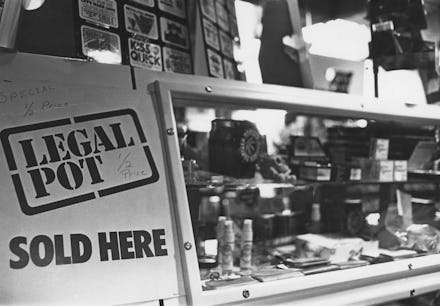Massachusetts is strong-arming legal pot shops to pay for more cops

As cannabis legalization efforts continue to roll across the country, some communities already enjoying the fruits of the legal weed movement have found themselves in an awkward position: If certain dispensaries want to continue operating, they first must pay significant fees to their respective communities — the vast majority of which, in the case of one Massachusetts town, is intended to compensate the city for adding new cops to its police force.
Earlier this month, cannabis shops Stem, Full Harvest Moonz, and CNA Stores in the city of Haverhill, Massachusetts, about 35 miles north of Boston, received an itemized report on the so-called "Impact Fees" the town claims it will incur as a byproduct of hosting the trio of legal dispensaries. But according to the state's Cannabis Control Commission chairman, the expenditures don't quite add up.
"We built a big industry, but it's not a new industry, as it's replacing an illicit industry that has existed for decades," Steven Hoffman told The Eagle-Tribune newspaper this week. “Things like training police on DUI and drug education has been going on for a long time and has nothing to do with the introduction of a legal business replacing an illegal business, therefore, a lot of the incremental expenses cities and towns are saying they are incurring — I just don't buy."
While impact fees are a known part of the legalization rules that helped usher in Massachusetts's current green market, the law effectively leaves it up to individual cities to determine what constitutes "reasonably related" expenditures, so long as the total doesn't top 3% of the store's total intake. For Haverhill, that amount came to $1.3 million, the vast majority of which was assigned to hiring six new police officers, two new police cruisers, and, per The Eagle-Tribune, "uniforms, weapons, holsters and other equipment," all for an annual cost of more than $860,000.
The problem, as Hoffman notes, is that there's not much evidence to suggest that the boost in police presence is actually necessary.
"There haven't been increases in youth consumption or crime or hospital admissions [statewide]," he explained. "The best evidence for that is Northampton, which is no longer asking for mitigation fees because they recognized there really aren't any incremental expenses they've incurred. I applaud them for recognizing that."
But taking a few steps back, it's hard not to see Haverhill's mitigation fee as an attempt to expand its police force of just over 100 officers and detectives at the sole expense of local businesses whose presence raises the specter of — but no actual evidence for — the sort of reefer madness panic that would necessitate more weaponized cops on the street.
At this point in the country's legalization process, it's become clear that regulating cannabis sales for adults is a lucrative, booming industry with the potential to provide a serious infusion of funds through taxation. On the other hand, cities that capitalize on a small, independently owned business to expand the very police forces that have spent decades criminalizing the source of their newfound funds — well that feels like exploitation, plain and simple.